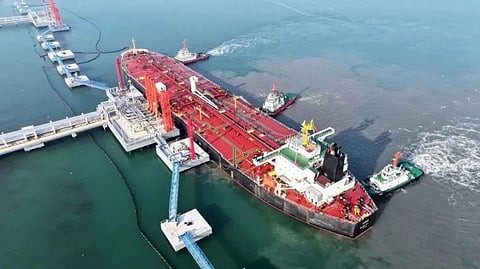

The volume of oil stored onboard ships in Asian waters doubled in recent weeks after tightening western sanctions hit imports from China and India and as a shortage of import quota curbed demand from independent Chinese refiners, analysts said.
The European Union, United Kingdom and the United States have imposed a raft of sanctions against Russia over its war in Ukraine, with the latest US embargo targeting Russia’s two top oil producers Rosneft and Lukoil last month.
Some refiners in China and India have switched to buying oil from the Middle East and elsewhere, providing support to global oil markets despite rising output.
Floating oil storage in the Asia-Pacific region hit a three-year high of 53 million barrels at end-October, surging by around 20 million barrels from early September, boosted by more storage of sanctioned crude from Iran and Venezuela, ship tracking firm Kpler said in a report on October 30.
"The increase we see in shadow crude volumes in Asia is explained by a high volume of these barrels at sea, and a difficulty in digesting all the arrivals in the Shandong independent refineries in China due to high inventories and a lack of remaining import quotas," said Mary Melton, a senior analyst with ship broker Braemar.
Separate data from shiptracker OilX showed potential floating storage in Asia jumped to about 70 million barrels by end-October from about 50 million barrels on October 15.
Data from shiptracker Vortexa showed that 161 million barrels of Iranian oil are held onboard ships in transit and storage currently, up 22.5 million barrels from end-September. The equivalent volume for Venezuelan oil is at 72.3 million barrels, up 6.6 million barrels from end-September, the data showed.
Energy and commodity trader Gunvor Group’s CEO Torbjorn Tornqvist said on Wednesday that Western sanctions are creating record volumes of oil stored onboard vessels, preventing a supply glut from forming in global markets.
"We are beginning to see rising numbers of Russian crude in floating storage on a daily and weekly basis," Melton added.
Independent refiners in China, the main buyers of Iranian oil, have slowed purchases amid rising fears of being targeted by US sanctions, which have already disrupted the supply chain.
The rapid build-up in oil supply from Russia, Iran and Venezuela has pushed prices of sanctioned crude into wide discounts, hitting oil revenues at these major producers.
Kpler said the volume of Russian oil kept onboard ships in the Asia-Pacific has also grown, seeing a six-fold increase to six million barrels in October from September, as Chinese and Indian buyers turned cautious.
"Russian exports to China may continue to face near-term pressure as US blocking sanctions on Rosneft and Lukoil deter state-run buyers," analysts at Kpler said.
"While Chinese independent refiners are less likely to be deterred, their demand remains low; many are reportedly near their 2025 import quota limits or have shifted to cheaper Iranian crude."
Market sources said Chinese independents largely ran out of 2025 import quota by end-September. China regulates crude imports by independent refiners under a strict quota system.
(Reporting by Siyi Liu in Singapore, Sam Li in Beijing and Jonathan Saul in London; Editing by Florence Tan and Ronojoy Mazumdar)
